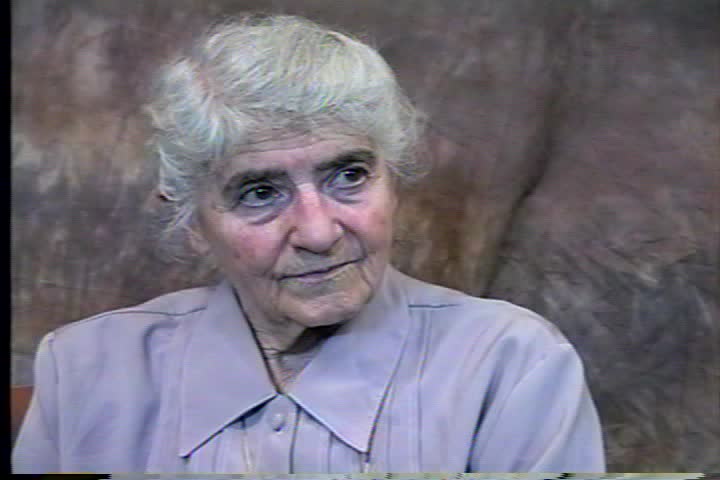The (Un)comfortability of Testimonies – Sarah Ernst
In this blog, 2024 Lev Student Research Fellow Sarah Ernst reflects on uncomfortable encounters with testimony.
“Do you want me to completely – or maybe not on tape – completely politically incorrect? Then I will, I will explain it to you.” – Marianne Z. Interview Code 52267. Tape 2, 1:09:53
Having just completed my third year of graduate studies on the Holocaust, I had (perhaps wrongly) assumed that I knew all the emotions that could come my way whilst watching testimonies housed in the USC Shoah Foundation Visual History Archive as the Beth and Arthur Lev Student Fellow. There are the commonplace “big emotions,” the sadness, anger, and hope that can emerge while hearing stories of loss, violence, and survival. And, as someone who studies queer histories of the Holocaust, I find myself often growing numb to the commonplace discussions of sexual violence in the camps or homophobia towards other prisoners.
And yet, this testimony from Marianne threw me. For one thing, right before this moment, she breaks the “fourth wall,” so to speak: this is done by remarking that the interviewer “must be very liberal, because you are frowning.” It’s an odd comment, one that forces the listener to remember the context of the testimony and the fact that there are people behind the camera. Marianne not only points out in this moment that faces cannot lie – even if interviewers are cautioned by certain guidelines on what to say – but, in her question of being “politically correct,” it hammers home the presumed structure of the testimony. It is one where – for many years – the focus seemed to be a larger story of survival that could perhaps be condensed for lay audiences to an “us vs. them,” all of which ended with hope and promises of “never again.” Marianne’s own testimony does not fit into this. In her conversation on abortion and homosexuality that follows this admittance, she goes on to talk about how, even though she had no problem working with a lesbian physician, she was disappointed that it was no longer legal in California for physicians to help queer people “quit” (i.e. conversion therapy).
When I finished this segment, I needed a moment to think about what was said by Marianne. Here was someone who I did not know, a survivor who produced a testimony that immediately made me feel uncomfortable. It was the ways in which Marianne matter-of-factly posited her beliefs that “99% of [queer people] are very unhappy,” or that abortion should not be allowed. It was also her discussion – as someone who converted to Christianity – that the Christians in the United States would soon be attacked by the country like the European Jews in the Holocaust. It just felt…off. I scrambled in my mind to recall the last time I had such a knee-jerk reaction to a testimony. Even after a month of residency, I could only think of one other: Eva H.
Eva was a Jewish nurse who had knowledge of the deportations in Hamburg during the Holocaust. At one point, before a deportation of Jewish persons, Eva recalled how she was asked to help bring a disabled Jewish child to the nearby psychiatric hospital. What follows in her recount is the steps she took – including negotiating with the Gestapos to take a taxi – to ensure this (in her words) “completely idiotical child” was not sent on the transport. When asked by the interviewer what happened to the child, Eva remarked that he was killed, seeming to justify it by noting that the Nazis “killed even people who were not that bad” (emphasis my own).
“People who were not that bad”…that bad. This was the moment – like Marianne’s discussion of the 99% unhappy – that threw me. In this moment, Eva differs from Marianne: it is not just a discussion of beliefs, but direct acts taken by her. It then because my duty – as the listener – to digest the fact that what I was listening to could be read as complacency in the “euthanasia” campaign under the Nazis. Despite the academic part of my brain wanting to place this one act in the context of the larger deportations and circumstances of wartime Hamburg. I wondered how I could deal with this testimony when I immediately disliked Eva?
Why, then, is this blog post about Marianne and Eva at all if they made me feel so uncomfortable? To that, I say it is precisely because of those feelings that I need to talk about them. These women – who for different reasons do not align nicely with the perceptions of what a testimony should include – nevertheless offer (perhaps) a more accurate narrative. They are not afraid to willingly place their messiness and ambivalences on tape, forever to be available to researchers in the distance future. I find that the knee-jerk reactions remind me much more than the “big emotions” that survivors are, above all, humans: people with different beliefs and attitudes to certain topics that might not align with perceptions of what one should expect when listening to the video testimonies. These are people who – for their own reasons and views and circumstances – react and act in different ways, all of which deserve to be part of what is remembered.
So, with a deep breath and a reflection, I continue to embrace the (un)comfortability of the messiness. The beauty of my work this summer is that I learned to accept the (un)comfortability and embrace a new way of engagement with the video testimonies. Because, if we take away the human from the narrative, are we truly grappling with this history?
Image Caption: Marianne Z. during her interview, San Francisco, CA.
